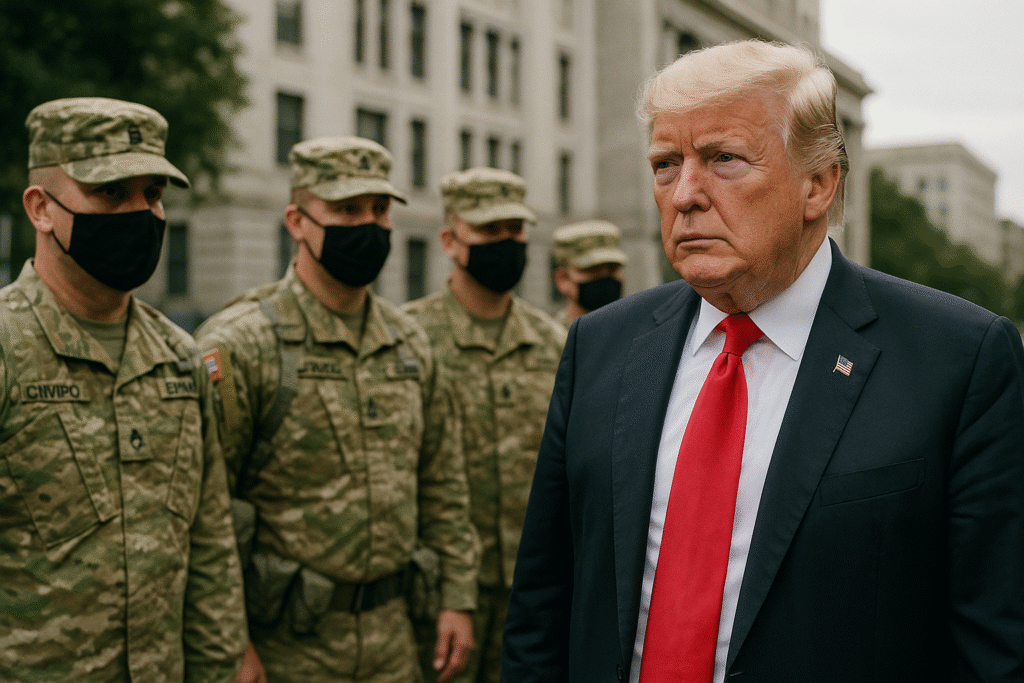By Harshit | October 9, 2025 | Washington, D.C. | 4:30 AM EST
Legal Showdown Over Federal Troop Deployments
President Donald Trump’s decision to deploy federalized National Guard troops in cities that did not request them faces a crucial legal test Thursday, as courts in Illinois and Oregon hear challenges that could determine the limits of executive authority over domestic military force.
In Chicago, Illinois officials are asking a federal judge to block the administration’s deployment of troops into the nation’s third-largest city. Meanwhile, more than 2,000 miles away in San Francisco, the 9th U.S. Circuit Court of Appeals will consider whether to keep in place a restraining order preventing Trump from federalizing Oregon’s National Guard for deployment in Portland.
The parallel hearings mark a rare moment in which two states are simultaneously battling the White House over the president’s domestic use of military power.
Illinois Sues to Block Chicago Deployment
Illinois Gov. JB Pritzker, a Democrat, said his state is defending its sovereignty. “We’re looking for the courts to do the right thing,” he told reporters Wednesday.
Illinois sued the Trump administration earlier this week, arguing that there is no emergency justifying the presence of federalized troops in Chicago. The lawsuit contends that Trump’s deployment is “illegal, unconstitutional, and unnecessary,” alleging that federal agents had already provoked unrest with “unprecedented, brute force tactics.”
Those tactics, according to the complaint, included using chemical munitions against groups that included journalists and legal observers, and staging a raid from Black Hawk helicopters. The lawsuit argues that far from restoring calm, the show of force has only fueled protests and fear.
As of Wednesday night, U.S. Northern Command confirmed that 500 troops had been mobilized — 300 from Illinois and 200 from Texas — with some already deployed in the greater Chicago area.
“These forces will protect U.S. Immigration and Customs Enforcement and other federal personnel who are performing federal functions,” Northern Command said in a statement.
Trump Defends Deployments, Floats Insurrection Act
Trump has insisted his actions are lawful and necessary. “Everything we’re doing is very lawful. What they’re doing is not lawful,” he told reporters at the White House.
Administration officials maintain that the president is fulfilling his responsibility to protect federal property and personnel, especially immigration enforcement officers. “President Trump will not stand by while violent rioters attack federal law enforcement officers,” White House spokeswoman Abigail Jackson said in a statement.
If courts block his authority, Trump has suggested he could invoke the Insurrection Act, a rarely used law that grants the president sweeping power to deploy active-duty military forces domestically.
Oregon Case Centers on Presidential Overreach
In Oregon, the Justice Department is asking the 9th Circuit to lift an order by U.S. District Judge Karen Immergut that halted the deployment of federalized National Guard troops to Portland.
Federal lawyers argue that Immergut’s ruling “improperly impinges on the Commander in Chief’s supervision of military operations” and endangers federal personnel. They also noted that earlier this year, the 9th Circuit blocked a similar restraining order in California, siding with the president.
But Immergut, a Trump appointee, distinguished the Portland case from California’s. She cited evidence that Trump exaggerated claims of violence, describing Portland as “war ravaged” and federal buildings as “under siege.”
Her order noted that in reality, protests had been small and “mostly uneventful” in the days leading up to Trump’s directive. On September 26 — the night before his order — law enforcement reported “approximately 8–15 people at any given time out front of ICE. Mostly sitting in lawn chairs and walking around.”
Stakes for Federal Authority and State Sovereignty
The cases raise significant constitutional questions over whether the president can override governors and deploy state National Guard units without their consent. Legal scholars say the disputes could ultimately end up before the Supreme Court.
Illinois officials argue that Trump’s actions infringe on state sovereignty, while Oregon’s case suggests the president is acting in bad faith by overstating threats to justify military involvement.
If the courts side with the administration, Trump’s authority to use federalized National Guard units against the will of state leaders could be significantly expanded. If they rule against him, it could place new limits on executive power and curb his ability to invoke the Insurrection Act.
For now, the outcome of Thursday’s hearings will signal how far the courts are willing to go in checking a president who has promised to use every tool available to impose what he calls “law and order” in America’s cities.

